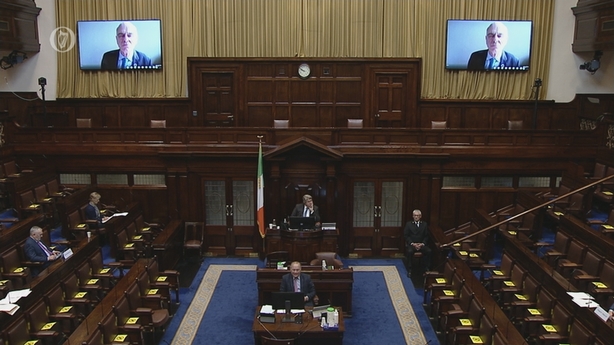The World Health Organization's special envoy Dr David Nabarro has told the Oireachtas special committee on Covid-19 that it would be really surprising if Ireland was to go into a complete national lockdown again.
Speaking by videolink from the WHO's Geneva headquarters, Dr Nabarro said that when clusters emerge, movement would be restricted locally as the pattern of the future would be picking up outbreaks quickly and therefore a total lockdown was highly unlikely.
He said he hoped it would not be necessary again to close Ireland's economy and he was also not keen on cocooning sections of the population.
Children appear to not have a central role in transmission of the virus, however schools could be an epicentre where the virus builds up.
On face coverings, he said there needed to be a push from saying people "should" wear them to people "must" wear them.
Dr Nabarro is particularly concerned about people who provide services, such as drivers, attendants and security guards.
He said it was "reasonable" that commuters should wear coverings for the sake of the people who look after them.
On the quality of various face coverings, Dr Nabarro said multiple layers were best, not of any special cloth. He said it was not about how the masks were made but how they were worn and there should be no gaps.
On physical distancing, he said the risk from Covid-19 was reduced the further away people are from each other.
We need your consent to load this rte-player contentWe use rte-player to manage extra content that can set cookies on your device and collect data about your activity. Please review their details and accept them to load the content.Manage Preferences
It comes after the Government recommended that face coverings be worn when in an enclosed location where physical distancing may not be possible, such as in shops or on public transport.
In a sitting of the committee earlier this week, Director of the National Virus Reference Laboratory Dr Cillian De Cascun told the Dáil special committee that the evidence around the use of cloth masks was "not fantastic".
However, he later said on RTÉ's Today with Sarah McInerney that face coverings should be worn when physical distancing cannot be maintained.
He said face coverings do not need to be worn in the open air, or if you are driving in your car. But they should be worn when entering shops, or boarding public transport.
Referring to his earlier comment to the committee, on the evidence for wearing cloth masks, Dr De Gascun said he "probably shouldn't have said not fantastic".
Dr Nabarro, meanwhile, has advocated for face masks, and said while it is up to national governments to decide their policy on face coverings, he wanted to encourage people to "take the advice super seriously and get into the habit of doing it".

Dr Nabarro told the Dáil there were increasing numbers of reports of people who had Covid-19 experiencing a really long and difficult recovery.
He said some people had a very long period of being extremely tired and cannot walk to the shops or concentrate on work.
In terms of people who exercise, some found that they were unable to continue exercising as they were perceived to have long-term lung damage, while others developed clots, which can lead to stroke or heart attack. He said we are just at the beginning of understanding the overall pathology of the disease.
He also said Ireland appeared to be at the upper end in terms of deaths in nursing homes, but he cautioned that different countries have different ways of recording deaths.
Meanwhile, the General Secretary of the National Bus and Rail Union has called for the compulsory
wearing of face masks on public transport to be introduced in law given the low compliance with recommendations.
Mr O'Leary told RTÉ's News at One that the Government had been "prevaricating" and sending out mixed messages despite the fact the NBRU wrote to the National Transport Authority on 1 May advising it as a necessity.
However, he said "practically nobody is wearing face masks".
Mr O'Leary said it was "long since past time" they legislated for it and stopped sending out mixed messages and legislated for it.
He said in France and Belgium you are fined if you do not wear a face mask on public transport and the UK has also introduced laws to provide for it.

